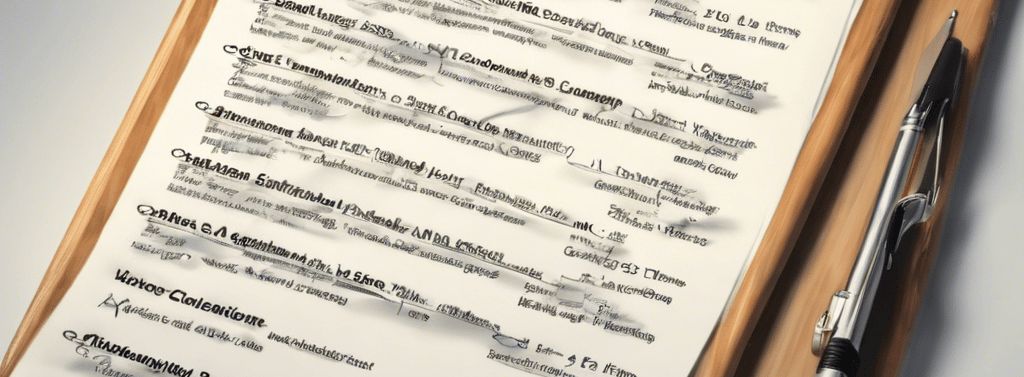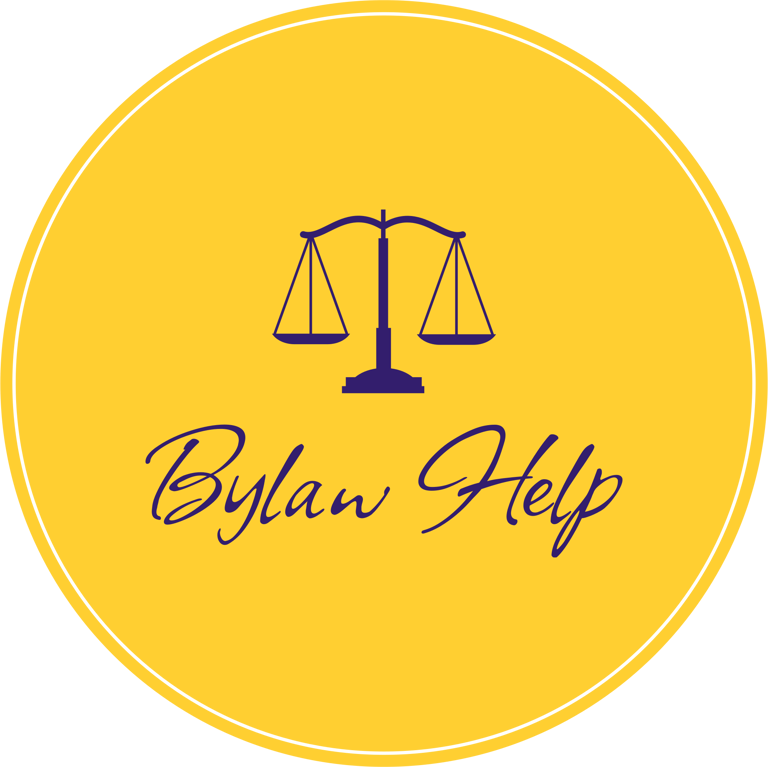

Ten Steps to Respond to a BC Bylaw Ticket
Table of Contents
STEP 1: IDENTIFY WHAT TYPE OF TICKET YOU RECEIVED
Before taking any action, determine whether your ticket is:
A statutory ticket, such as:
Municipal Ticket Information (MTI)
These are the most easily identified, as their form is set out in provincial regulation. They will always say "Municipal Ticket Information" at the top.
These are harder to identify because each local government can vary their format and even their names. For example, some communities title them as Bylaw Offence Notices, others as Bylaw Enforcement Notices, etc.
Look for language indicating that, if the ticket is not responded to within a certain time frame, the recipient will be automatically found liable and the penalty will be due.
If not clear on whether the ticket is a Bylaw Notice or not, contact the issuing local government to enquire.
A voluntary penalty ticket, such as:
Notice of Bylaw Infraction (used exclusively for parking infractions).
Other non-statutory “voluntary penalty” or “love note” tickets issued by some local governments.
As with Bylaw Notices, these tickets can sometimes be hard to identify since there is no province-wide mandated format that all communities use, and each local government can come up with its own design.
Look for language indicating the penalty is "voluntary" and that payment will avoid legal proceedings.
If not clear whether the ticket is a voluntary penalty ticket or not, contact the issuing local government to enquire.
STEP 2: UNDERSTAND THE LEGAL EFFECTS OF YOUR TICKET
If you received a statutory ticket (MTI or Bylaw Notice):
There are strict deadlines to dispute.
Failing to respond can result in automatic legal liability.
The penalty can become due and payable by operation of law.
The local government can use statutory debt collection mechanisms. Examples include obtaining court orders to seize and sell your property or garnish your wages.
Local government may refer debt to a collection agency.
If you received a voluntary penalty ticket:
Payment is described as voluntary.
Ignoring it does not automatically create a court judgment or statutory debt.
However, the local government may:
Initiate prosecution for the bylaw violation, by laying an information in Provincial Court under the Offence Act, or
Refer the unpaid amount to a collection agency.
Even though liability is not automatic, ignoring a voluntary penalty ticket may still carry practical consequences.
STEP 3: DO NOT IGNORE TICKETS
If your ticket is an MTI or Bylaw Notice:
Carefully note the dispute deadline.
Failure to respond within the prescribed time may result in being deemed liable.
Additional fees or surcharges may be added.
The amount may be enforceable as a debt.
Timelines are strict.
If your ticket is a voluntary penalty ticket:
Even though failing to respond to these tickets does not establish automatic statutory liability, ignoring them can still result in significant consequences.
Local governments may decide to escalate enforcement action by initiating prosecution under the Offence Act.
Alternatively, some local governments may refer unpaid amounts to debt collection agencies, even without first obtaining a judgment in court proceedings.
STEP 4: CONSIDER YOUR OPTIONS FOR VOLUNTARY PENALTY TICKETS
If you received a Notice of Bylaw Infraction or similar voluntary penalty ticket:
There is no standard province-wide dispute form or adjudication process set out by provincial law.
You may contact the issuing local government to raise concerns.
Be aware that, if you ignore the ticket, there is a risk of:
Ticket being referred to debt collection agency
Prosecution under the Offence Act for the bylaw violation
Escalating enforcement measures (e.g., your vehicle may be towed rather than ticketed for future parking violations)
Because these tickets operate outside statutory regimes, procedures vary.
STEP 5: EVALUATE POSSIBLE DEFENCES
Whether you have a statutory or voluntary penalty ticket:
Review the applicable bylaw.
Confirm the alleged contravention actually occurred.
Look for procedural defects (improper service, incorrect information).
Consider evidentiary weaknesses.
Review relevant case law (CanLII is a useful resource).
If unsure, consult a qualified lawyer or paralegal.
STEP 6: DECIDE WHETHER TO DISPUTE OR PAY
Conduct a cost-benefit analysis.
Consider strength of potential defences vs. fine amount.
Factor in time and effort required to dispute the ticket.
For a small fine, it may not be worth the time and effort required to dispute the ticket.
If fine is larger, or if you feel strongly that the ticket is unfair, the investment of time and effort may be worthwhile.
STEP 7: FILE A DISPUTE
If disputing an MTI or Bylaw Notice:
Use the correct dispute form.
Meet all deadlines.
Submit complete and accurate information.
Keep proof of submission.
Missing the deadline may forfeit your right to dispute.
Screening Officer Stage for Bylaw Notice Disputes:
In many municipalities, the dispute is initially reviewed by a Screening Officer before it proceeds further.
This officer may:
Cancel the ticket if they determine it was improperly issued.
Offer the ticket recipient a compliance agreement, which typically:
Reduces the penalty in exchange for admitting responsibility.
May include conditions, such as taking steps to correct the bylaw contravention; for example, in the case of a bylaw notice issued for littering, the compliance agreement may require the person in question to pick up the litter.
Important considerations about compliance agreements:
Signing a compliance agreement is considered an admission of liability, meaning you cannot dispute the ticket later.
If you fail to fulfill the terms of the compliance agreement, the Screening Officer may cancel the agreement and reinstate the full penalty.
If disputing a voluntary penalty ticket:
Voluntary penalty tickets do not have dispute mechanisms specified by statute, but some local governments may establish their own dispute processes, including dispute forms. Other local governments may have more informal processes, such as allowing recipients to verbally dispute their tickets with a supervisor or manager.
STEP 8: PREPARE FOR TRIAL OR HEARING (IF APPLICABLE)
MTI (Provincial Court):
Dispute is dealt with by trial in Provincial Court of British Columbia.
The ticket recipient's guilt must be proven to the criminal standard (proof beyond reasonable doubt).
Presided over by a Provincial Court Judge or Judicial Justice of the Peace.
Criminal rules of evidence apply, although judge or justice of peace has some discretion for flexibility.
Bylaw Notice:
Dispute is heard outside court at an adjudication hearing.
The ticket recipient's liability must be proven to the civil standard (proof on the balance of probabilities).
Presided over by an Adjudicator.
Evidence rules are more flexible than in court.
Voluntary Penalty Tickets:
These tickets do not have trials or hearings, unless the local government decides to escalate matters and pursue a prosecution under the Offence Act.
Prepare for a trial or hearing by:
Gathering photographs and documents.
Obtaining witness statements.
Requesting disclosure of the local government’s evidence and identifying any weaknesses.
Researching relevant caselaw for precedents that are helpful to your defence.
At your trial or hearing, remember to:
Dress in business casual clothing.
Be respectful and professional in your language.
Politely point out any procedural or evidentiary weaknesses in the prosecution's case.
Cite any relevant caselaw that is helpful to your defence.
STEP 9: RESPOND TO AN UNFAVOURABLE DECISION
If you lose:
If you lose a trial in Provincial Court, the court may order you to pay the fine.
The Provincial Court has the ability to reduce fines, or in some cases, to increase fines, if the court deems it appropriate.
In Provincial Court, if you cannot afford to pay a fine all at once, you can request time for payment. The court may grant this extra time if it deems it appropriate.
If you lose a hearing before an Adjudicator, the penalty is immediately due and the Adjudicator does not have authority to reduce the prescribed penalty and may, in some cases, add administrative fees.
Further options:
The outcomes of trials and hearings can be appealed or reviewed.
MTI trial results must be appealed to the Supreme Court of British Columbia within 30 days.
Bylaw Notice adjudication results can be referred to judicial review in the Supreme Court if an application is made within 30 days.
Filing an appeal or judicial review does not automatically suspend enforcement of a fine; you may need to apply to a court for a stay to suspend payment.
Appeals and judicial reviews involve complex legal issues and should not be undertaken lightly.
Voluntary penalty tickets do not have formal appeal mechanisms.
STEP 10: MINIMIZE LEGAL COSTS
Legal advice can help assess:
Strength of your defence.
Procedural fairness.
Likelihood of success for an appeal or judicial review.
However:
Legal services can be costly.
Some professionals offer brief initial consultations.
Community legal clinics or reduced-cost services may be available.
Dial-A-Law can be a useful starting point.
SUMMARY / KEY TAKEAWAYS
First determine whether your ticket is a statutory or voluntary penalty ticket.
Statutory tickets carry strict deadlines and automatic consequences for missing those deadlines.
Voluntary penalty tickets do not automatically create legal liability, but may lead to collection efforts or prosecution if ignored.
Understand the legal and practical consequences of ignoring tickets.
Decide whether you wish to dispute your ticket, after considering the possible cost in time, money and effort.
If you decide to dispute, file your dispute properly and on time where formal processes exist.
Seek legal advice where appropriate.
If your dispute is unsuccessful, carefully weigh costs before escalating matters to higher courts.
FREE LEGAL RESOURCES
General Legal Resources
Dial-A-Law (BC) – Free information on legal subjects, including municipal and bylaw issues.
CanLII – Free access to BC case law and legislation to research bylaw and municipal cases.
BC Laws – Official source for British Columbia statutes and regulations.
Bylaw Specific Resources
BC Provincial Court – Traffic & Municipal Tickets – Information on disputing tickets, court locations, and procedures.
Community Legal Support
Access Pro Bono – Free legal advice and representation for eligible British Columbians.
Pro Bono Students Canada – Law student-run clinics that provide free guidance under supervision.
Debt & Collections Guidance
Consumer Protection BC – Guidance on dealing with debt collection, including unpaid bylaw tickets.
